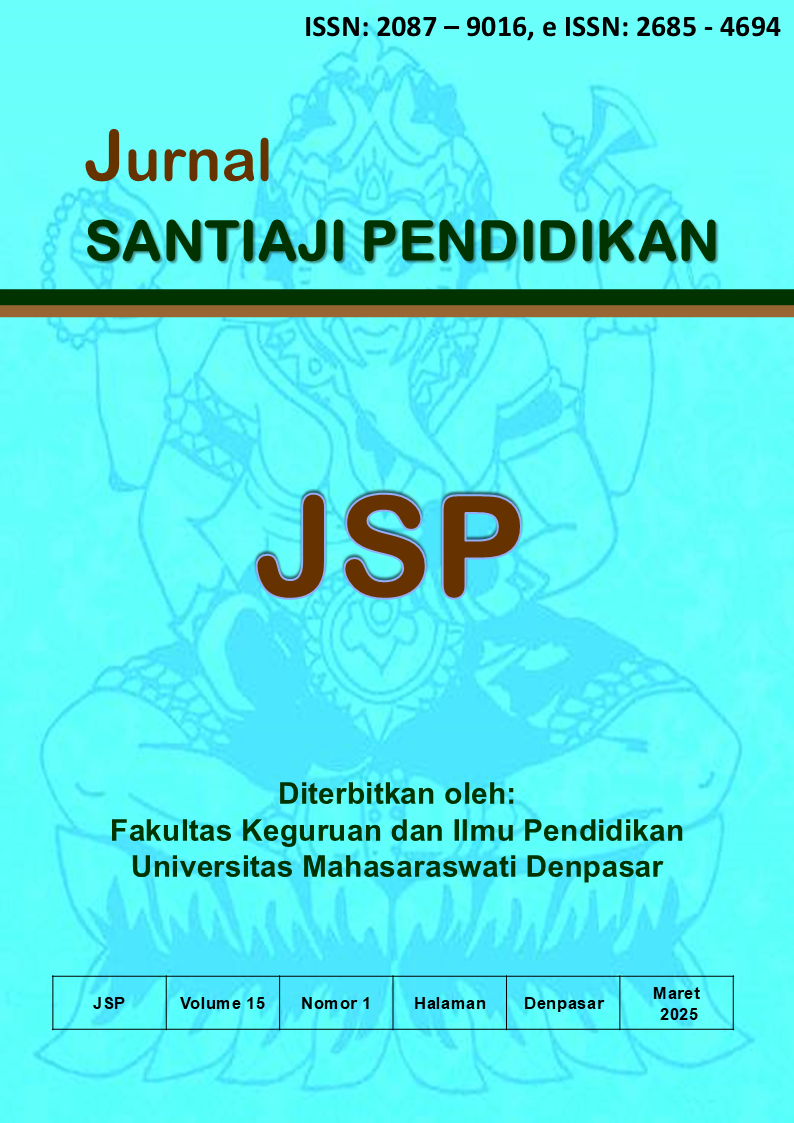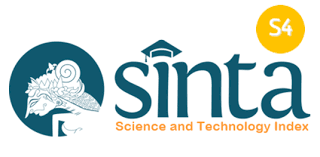STUDENTS’ PERCEPTIONS OF THE INTEGRATION OF TRI HITA KARANA VALUES IN DESCRIPTIVE WRITING
DOI:
https://doi.org/10.36733/jsp.v15i1.10545Keywords:
Descriptive Writing, Students' Perception, Tri Hita KaranaAbstract
This study explored students’ perception toward the implementation of Tri Hita Karana (THK) in descriptive paragraph writing activity in English Language Education Study Program Unmas Denpasar. This qualitative study aims to find out students’ perception of the application of THK in descriptive writing class. This study employed qualitative method involving 30 students of English Language Education Study Program. The data were collected through semi-structure interview. The analysis was focused on related themes with the students’ perceptions of the integration of THK values in descriptive paragraph writing. The result of the research indicated that in general the students see it positively to the integration of THK with descriptive writing activity. They feel that the values of THK improved the quality of their descriptive writing by writing more meaningful content which is culturally more relevant. Students also noted that these values help them express their idea more creatively and deeply connected with the writing topic. This finding showed that integrating the values of local culture like THK in English learning could enhance students’ descriptive writing skill and culture understanding. This approach makes the students learning process more interesting and contextually meaningful for students.
Downloads
References
Hartayani, N. and Wulandari, I. (2022). Improving the creative character of elementary school students through Tri Hita Karana habituation. Indonesian Values and Character Education Journal, 5(2), 67-76. https://doi.org/10.23887/ivcej.v5i2.49938
Lisrianto, M. (2023). Penahelix integrated health protocol education model for covid-19 pandemic handling based on Tri Hita Karana. Multidisciplinary Science Journal, 5, 2023069. https://doi.org/10.31893/multiscience.2023069
Mahaardhika, I. (2023). Implementation of Tri Hita Karana values for forming student’s clean and healthy living behavior. Indonesian Journal of Educational Development (Ijed), 4(1), 102-109. https://doi.org/10.59672/ijed.v4i1.2705
Suarni, K. (2023). The effect of the Tri Hita Karana-oriented problem-based learning model on ecological attitudes and learning outcomes. Indonesian Journal of Educational Development (Ijed), 4(2), 173-183. https://doi.org/10.59672/ijed.v4i2.3048
Trisnawati, K. and Sukmana, A. (2020). The role of playing model learning based on Tri Hita Karana improve indonesian language learning outcomes. Journal of Education Technology, 4(3), 302. https://doi.org/10.23887/jet.v4i3.27088
Wirahyuni, K., Suandi, I., Martha, I., & Sudiana, I. (2021). Integrating balinese local wisdom of Tri Hita Karana: primary school teachers’ belief. Alinteri Journal of Agricultural Sciences, 36(2), 132-139. https://doi.org/10.47059/alinteri/v36i2/ajas21133
Atmowardoyo, H., Weda, S., & Sakkir, G. (2021). Learning strategies in english skills used by good language learners in millennial era: a positive case study in universitas negeri makassar. Elt Worldwide Journal of English Language Teaching, 8(1), 28. https://doi.org/10.26858/eltww.v8i1.20339
Fadhillah, N., Sudjarwo, S., & Habsari, D. (2023). Students’ perception of project based learning in writing class. International Journal of Education and Digital Learning (Ijedl), 1(3), 65-70. https://doi.org/10.47353/ijedl.v1i3.12
Hartayani, N. and Wulandari, I. (2022). Improving the creative character of elementary school students through Tri Hita Karana habituation. Indonesian Values and Character Education Journal, 5(2), 67-76. https://doi.org/10.23887/ivcej.v5i2.49938
Lisrianto, M. (2023). Penahelix integrated health protocol education model for covid-19 pandemic handling based on Tri Hita Karana. Multidisciplinary Science Journal, 5, 2023069. https://doi.org/10.31893/multiscience.2023069
Mahardhika, I. (2023). Implementation of Tri Hita Karana values for forming student’s clean and healthy living behavior. Indonesian Journal of Educational Development (Ijed), 4(1), 102-109. https://doi.org/10.59672/ijed.v4i1.2705
Morgan, B., Fuisting, B., & White, J. (2014). University student attitudes towards peer review in efl writing: a quantitative study. Language Education in Asia, 5(1), 93-116. https://doi.org/10.5746/leia/14/v5/i1/a08/morgan_fuisting_white
Moybeka, A. (2023). Developing efl students’ writing ability through contextual teaching and learning (a classroom action research study). Journal of English Culture Language Literature and Education, 11(1), 79-97. https://doi.org/10.53682/eclue.v11i1.6107
Suarni, K. (2023). The effect of the Tri Hita Karana-oriented problem-based learning model on ecological attitudes and learning outcomes. Indonesian Journal of Educational Development (Ijed), 4(2), 173-183. https://doi.org/10.59672/ijed.v4i2.3048
Syifa, Q., Baekani, A., & Srisudarso, M. (2022). Junior high school students’ difficulties in writing descriptive text. Jiip - Jurnal Ilmiah Ilmu Pendidikan, 5(10), 4470-4474. https://doi.org/10.54371/jiip.v5i10.1044
Trisnawati, K. and Sukmana, A. (2020). The role of playing model learning based on Tri Hita Karana improve indonesian language learning outcomes. Journal of Education Technology, 4(3), 302. https://doi.org/10.23887/jet.v4i3.27088
Wirahyuni, K., Suandi, I., Martha, I., & Sudiana, I. (2021). Integrating balinese local wisdom of Tri Hita Karana: primary school teachers’ belief. Alinteri Journal of Agricultural Sciences, 36(2), 132-139. https://doi.org/10.47059/alinteri/v36i2/ajas21133
Downloads
Published
Issue
Section
License
Copyright (c) 2025 Ni Made Wersi Murtini, I Made Sutajaya, I Wayan Suja

This work is licensed under a Creative Commons Attribution 4.0 International License.











